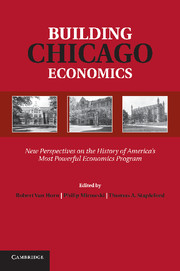 Building Chicago Economics
Building Chicago Economics Book contents
- Frontmatter
- Contents
- Figures and Tables
- Contributors
- Blueprints
- Orientation: In Search of the Chicago School
- Part One Economics Built for Policy: the Legacy of Milton Friedman
- One Positive Economics for Democratic Policy
- Two Markets, Politics, and Democracy at Chicago
- Part Two Constructing the Institutional Foundations of the Chicago School
- Part Three Imperial Chicago
- Part Four Debating “Chicago Neoliberalism”
- Index
- References
One - Positive Economics for Democratic Policy
Milton Friedman, Institutionalism, and the Science of History
from Part One - Economics Built for Policy: the Legacy of Milton Friedman
Published online by Cambridge University Press: 05 November 2011
- Frontmatter
- Contents
- Figures and Tables
- Contributors
- Blueprints
- Orientation: In Search of the Chicago School
- Part One Economics Built for Policy: the Legacy of Milton Friedman
- One Positive Economics for Democratic Policy
- Two Markets, Politics, and Democracy at Chicago
- Part Two Constructing the Institutional Foundations of the Chicago School
- Part Three Imperial Chicago
- Part Four Debating “Chicago Neoliberalism”
- Index
- References
Summary
As economics pushes on beyond “statics,” it becomes less like science, and more like history.
– Sir John R. Hicks , xiConventional wisdom would place early institutional economics and the postwar Chicago School on opposite ends of any methodological spectrum. Prominent faculty and graduates from postwar Chicago have derided institutional economics not merely as incorrect but as actually devoid of content. Thomas Sowell characterized it as “half economics, half sociology, and all mush” (Sowell , 788); Ronald Coase claimed it “had nothing to pass on except a mass of descriptive material waiting for a theory, or a fire” (Coase , 230); and George Stigler found it vacuous beyond “a stance of hostility to the standard theoretical tradition” (Kitch , 170).
Nonetheless, recent scholarship has softened this superficially sharp contrast. In the first place, institutionalism encompassed a diverse range of approaches (Rutherford ), and postwar Chicago economists have been noticeably less critical of at least one prominent strand: the quantitative analysis associated with Wesley C. Mitchell, the National Bureau of Economic Research (NBER, cofounded by Mitchell), and some aspects of the Robert Brookings Graduate School (forerunner of the Brookings Institution). Stigler expressed grudging respect for Mitchell, and Milton Friedman likewise concluded that Mitchell was “not as empty of content as most of the [institutionalists]” (Kitch , 170, 171). In fact, Friedman spoke quite positively about Mitchell in a lengthy posthumous assessment in 1950 in which he argued for viewing Mitchell as an “economic theorist” (Friedman ), a significant label because the most common objection to institutional economics from postwar Chicago was its alleged neglect of theory (e.g., Kitch , 169–171).
- Type
- Chapter
- Information
- Building Chicago EconomicsNew Perspectives on the History of America's Most Powerful Economics Program, pp. 3 - 35Publisher: Cambridge University PressPrint publication year: 2011
References
- 7
- Cited by


